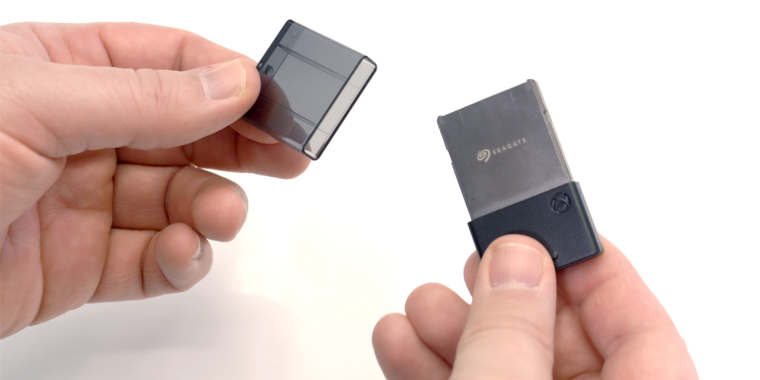
-
A visualization shows how the expansion storage-card slots into the back of the Xbox Series X.
-
It really does resemble an old PlayStation memory card in size and general shape.
-
Seagate is already advertising its own version of the storage-expansion format.
This morning, Microsoft dumped a massive cache of details on the Xbox Series X’s internal specs and features. But the most surprising revelation buried in that info dump might be the fact that the system uses a proprietary solution for expanding its 1TB of internal game storage.
Digital Foundry’s deep-dive report on the Series X, created in close conjunction with Microsoft, shows off a 1TB SSD expansion card, which the site says is “very short, quite weighty for its dimensions, and actually presents rather like a memory card.” TheNVMe memoryon that card (which looks about half the size of a standard NVMe stick) connects through the back of the system using the same PCI Express 4.0 connection as the system’s internal memory (this is the rectangular “mystery slot” seen next to the Ethernet portwhen images of the Series X ports leaked in January).
The Series X will still support standardized USB 3.2 hard drives, according to the Digital Foundry report, but those can only be used to natively run backward-compatible games designed for previous Xbox systems (the Xbox One, 360, and original Xbox). For Series X games, a USB hard drive can only be used as a backup solution, where you can “park” games that then need to be shuffled over to the internal storage to be played.
The use of the proprietary memory format is apparently to enable what Microsoft is now calling the “Xbox Velocity Architecture,” thelong-teased featurethat allows for much faster loading of content than that of even high-speed solid-state drives. Digital Foundry says this custom NVMe drive system in the Series X can access data at a constant 2.4GB/s,compared tojust 0.6 GB/s for a USB 3.0 hard drive or 0.75 GB/s for high-end SATA SSD drives. That allows “100GB of game assets stored to be instantly accessible by the developer,” as Microsoft puts it (though the company’s use of “instantly” is a bit squishy for our tastes, especially when compared with the system’s much faster RAM access speeds).
Despite the exclusive format, Microsoft does not look like it wants to be the exclusive manufacturer and seller of these storage expansion cards, as it was for the overpriced proprietary hard drive format on the Xbox 360. Seagate has already announced its own 1TB Storage Expansion Card for Xbox Series X that it says is “built in partnership with Xbox” and “seamlessly replicat[es] the full speed and performance of the Series X’s internal storage.”
Neither Microsoft nor Seagate is discussing pricing for these storage expansions as of yet, but we can’t imagine they’ll be cheap. A 1TB Seagate NVMe drive for PCs currently sells for a $200 MSRP at retail, compared to $130 for a standard SSD or about $50 for an external USB hard drive of the same size. Microsoft’s proprietary size and format for the Series X expansion could increase the manufacturing costs and pricing as well.
Proprietary storage formats in game consoles have been falling out of favor ever since Microsoft charged a hefty premium for its exclusive hard drive design on the Xbox 360. Since then, Sony’s PSP and Vita portables stand out for using expensive and cumbersome proprietary memory card formats.
The Nintendo Switch uses standard MicroSD cards for game storage. On the PlayStation 4, you can replace the built-in internal hard drive with a standard 2.5 inch drive, though the process is a bit cumbersome.
Listing image by Seagate






